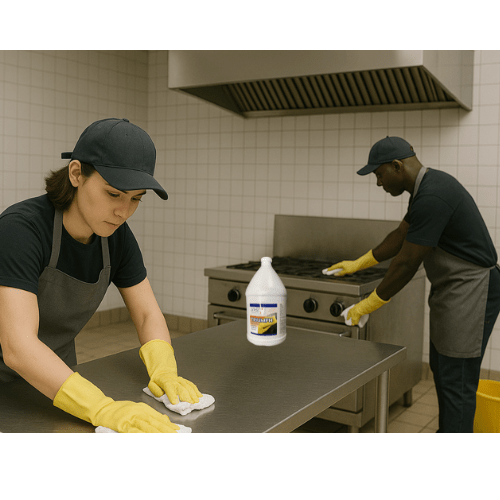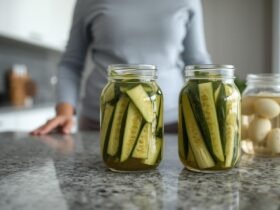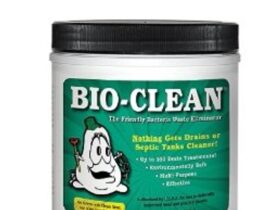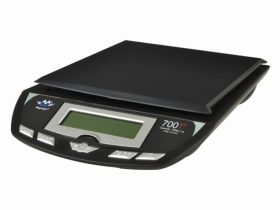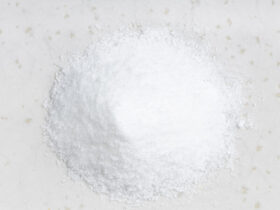New Era of Sustainable Cleaning Green Chemistry in Cleaning
Over the past decade, the demand for eco-friendly, sustainable cleaning solutions has grown dramatically. Businesses, households, and industries now expect products that not only clean effectively but also reduce environmental impact. Thanks to advances in surfactant chemistry and the development of safer glycol ethers, we are seeing powerful new cleaners that strike the balance between performance, safety, and sustainability by using less water and work better.
This article explores how biodegradable cleaners that are sustainable long term and developed using more scientific advanced surfactants, and glycol ethers are reshaping cleaning practices in homes, factories, and transportation, elping us clean smarter while protecting our environment.
Why Old Traditional Cleaning Products Fall Short
For decades, cleaning products relied on outdated more harmful chemistry:
- Environmental impact – Many older cleaning products used dangerous phosphates, petroleum-based surfactants, and harsh chemicals that polluted waterways and contributed to water pollution in rivers and streams. The products are not as effective and not long term sustainable cleaning products.
- High chemical use – Traditional cleaners often required heavy concentrations, leading to waste and hazardous runoff.
- Health and safety risks – Harsh solvents created risks to the users of the products like skin irritation, respiratory issues, and other workplace hazards. They also contribute to more environmental risks.
The result? A need for innovative formulations that clean better without harming people or the planet.
Breakthrough #1: Biodegradability Sustainability and Environmental Safety
Modern surfactant chemistry has delivered one of the most important advances—readily biodegradable cleaning agents that can help us make more earth friendly and long term sustainable cleaning products.
When more hazardous cleaners enter wastewater systems, they break down into harmless components like carbon dioxide, water, and salts. This minimizes their presence in rivers, lakes, and oceans, while reducing strain on municipal treatment plants.
Compared to older chemicals, today’s more advanced and eco-friendly cleaners and degreasers:
- Break down faster in wastewater treatment.
- Do not persist in aquatic ecosystems.
- Meet more stringent EPA and OECD biodegradability standards.
Breakthrough #2: Higher Cleaning Efficiency with Less Product and Water
New surfactants and glycol ethers aren’t just safer—they’re also more effective and contribute to better cleaning and to more sustainable cleaning products. Key advantages include:
- Reduced chemical usage to achieve the same or better results.
- Less water required in dilution and clean up.
- Lower energy and water requirements.
- Broader performance across industrial, commercial, and household applications while using less water.
For example, Linear Alcohol Ethoxylates (LAEs) are highly effective nonionic surfactants that excel at removing oily soils, while Propylene Glycol n-Butyl Ether (PnB) has become a preferred solvent in degreasers for its strong performance and lower toxicity. These types of products are the key to being able to build sustainable cleaning products that consumers will use.
Advanced Surfactant Chemistry: The Backbone of Eco-Friendly Sustainable Cleaning Products
Modern Surfactants That Contribute to More Sustainable Cleaning Products:
- Linear Alcohol Ethoxylates (LAEs) – Nonionic, biodegradable, and effective in heavy-duty degreasers.
- Alkyl Polyglucosides (APGs) – Derived from corn and coconut oil, renewable, mild, and widely used in green cleaners.
- Amphoteric Surfactants (e.g., betaines) – Biodegradable, versatile across pH ranges, used in both household and industrial products.
- SLS Alternatives – Provide foaming and cleaning power without the environmental drawbacks of sodium lauryl sulfate.
These innovations mean businesses no longer have to choose between cleaning strength and sustainability.
Better Glycol Ether Innovation: Better Cleaning with Lower Toxicity
Surfactants handle surface tension, but glycol ethers are the solvents that dissolve oils, resins, and greases. Modern glycol ethers have been re-engineered to be safer, more biodegradable, and lower in emissions.
Leading Eco-Friendly Glycol Ethers
- Propylene Glycol n-Butyl Ether (PnB): Strong solvent power with lower volatility.
- Dipropylene Glycol Methyl Ether (DPM): Safer handling, excellent solvency for coatings and cleaners.
- Propylene Glycol Methyl Ether Acetate (PMA): Balances strong solvency with biodegradability, widely used in paints and cleaners.
Real-World Applications of Advanced Chemistry-Sustainable Cleaning
1. Household Cleaners
Consumers benefit from safer dish soaps, dish washing soap, as well as multipurpose sprays made with APGs and biodegradable solvents, giving effective cleaning without toxic residue.
2. Industrial Cleaners & Degreasers
Industrial plants and manufacturing factories once depended on toxic chemicals like chlorinated solvents for cleaning. Today, modern surfactants and glycol ethers offer great performance so those toxic chemicals can be replaced with sustainable biodegradable, safer chemisty in the formulations —offering greater cleaning power using sustainable cleaning products that have less environmental risks.
3. Automotive & Transportation Cleaning
Car washes and fleet maintenance facilities now use advanced surfactant blends that:
- Deliver superior cleaning results.
- Reduce water usage through oil-water separation and water recycling.
- Lower the environmental impact of wastewater discharge.
The Environmental Payoff
Switching to advanced biodegradable cleaners delivers broad benefits:
- Cleaner waterways – Fewer persistent chemicals in rivers and lakes.
- Healthier workplaces – Reduced exposure to harsh solvents.
- Smaller carbon footprint – Many surfactants now come from renewable plant-based sources.
- Regulatory compliance – Aligns with EPA Safer Choice, EU REACH, and other global standards.
Looking Ahead: The Future of Green Cleaning Chemistry
The evolution of cleaning chemistry is just beginning. Innovations in progress include:
- Enzyme-enhanced cleaners that work in synergy with surfactants.
- Bio-based glycol ethers made from agricultural byproducts.
- Smart surfactants that adapt to different cleaning conditions.
These developments will continue to push the industry toward circular, sustainable cleaning systems.
Conclusion: Sustainable Cleaning Without Compromise
Modern surfactants and glycol ethers make it easier and more cost effective to build more sustainable cleaning products tjay are more effective, safer, and eco-friendly. By adopting these innovations, industries and households alike gain superior cleaning results while protecting the planet.
The future of more eco friendly cleaning with better long term sustainable products is here—and every spray, scrub, and rinse can now be part of a greener tomorrow.
As a consumer, read labels and look for more odern surfactants and glycol ethers as you seek out better, more eco-friendly cleaning products. Also look for products that are balanced in their effectiveness and how they are diluted, and also how easily they can be rinsed away. Just as important – always try to use LESS WATER when cleaning.
If you are a formulator that is sourcing chemicals and ingredients for building effective eco friendly cleaners check out Level 7 Chemical. Level 7 offers great selection of specialty products for building modern cleaners and degreasers. For formulators and researchers searching for advanced, more specialized glycol ethers like Glycol n-Butyl Ether (PnB) and other quality surfactants Level 7 Chemical has them, plus many other great products .
Check out this article about modern laundry care product that is a great reference on an interesting topic







